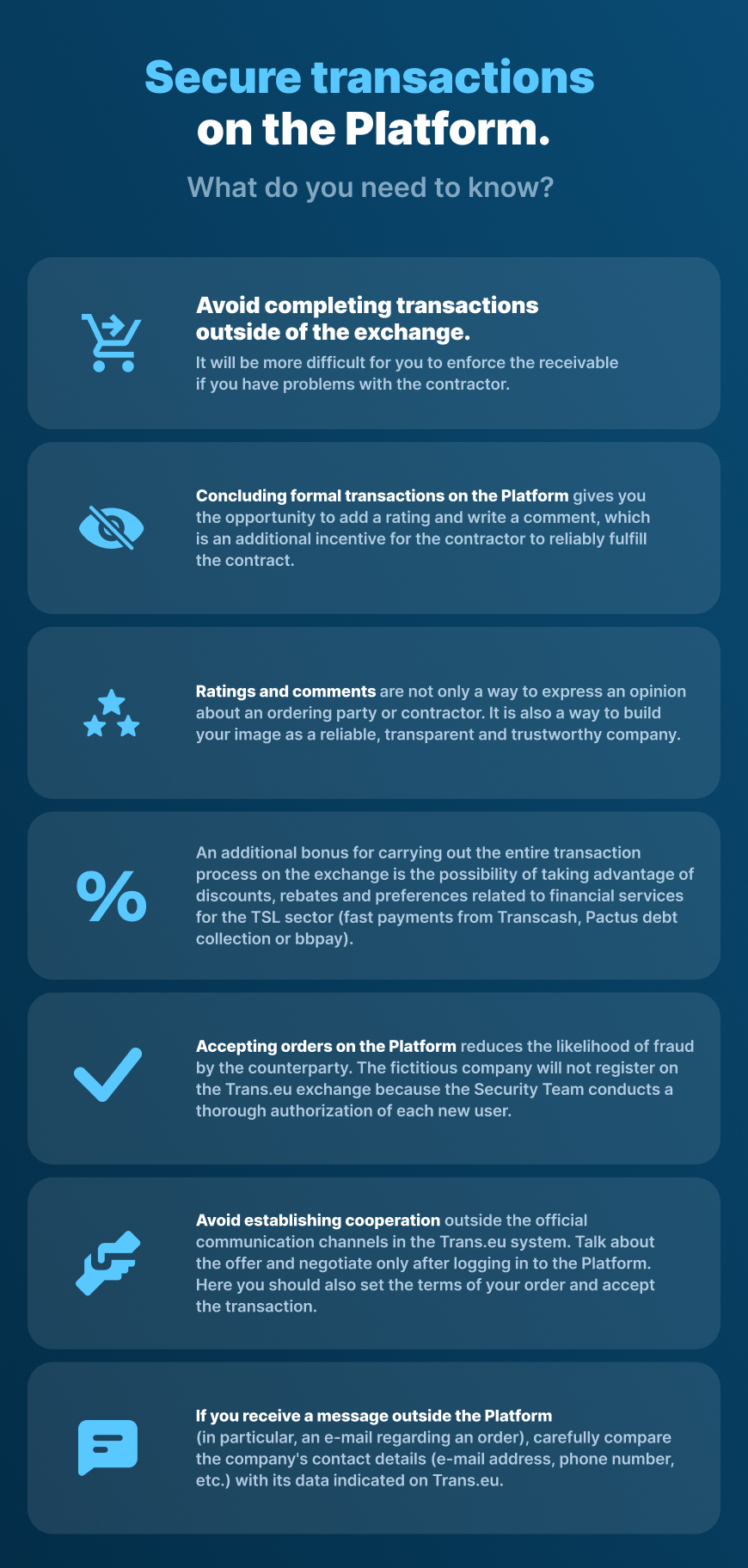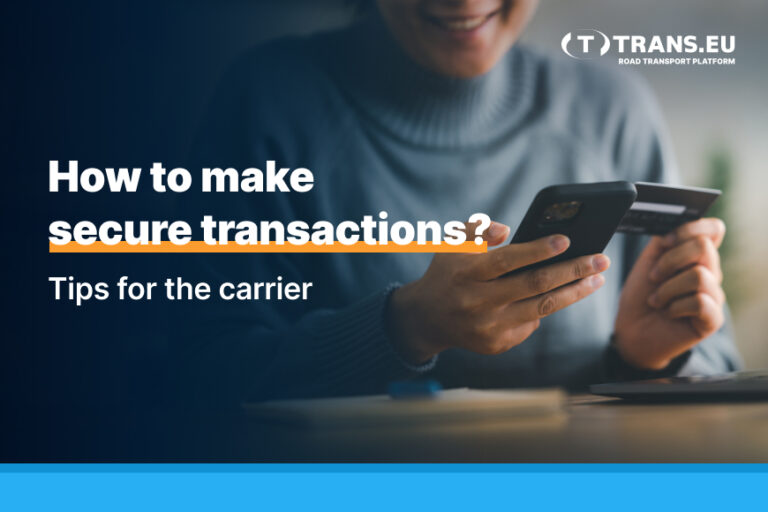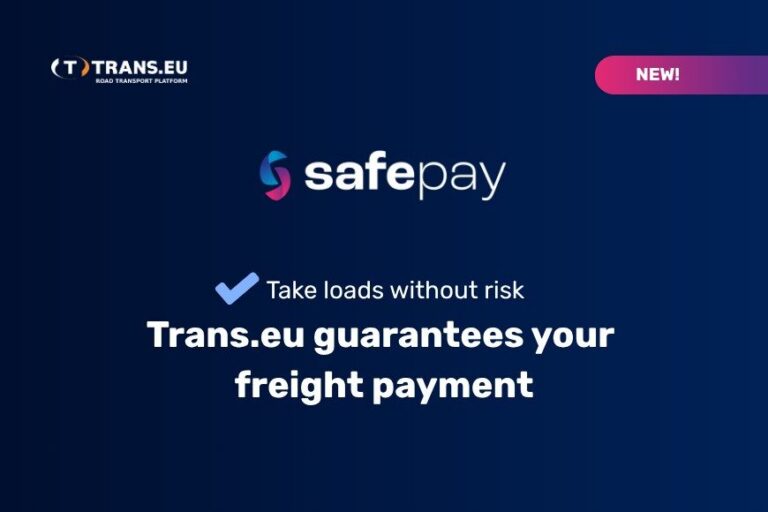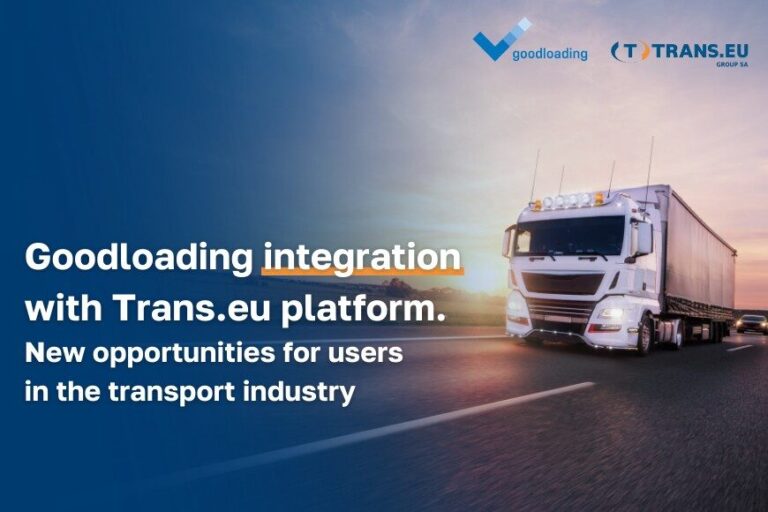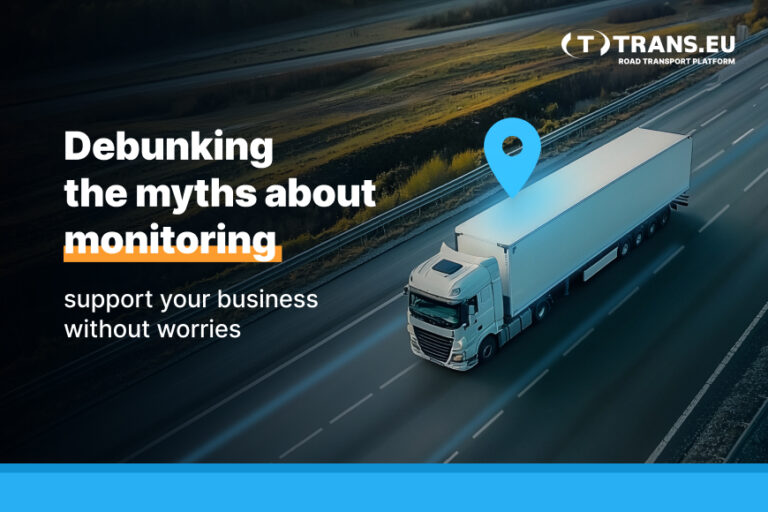When does a formal transaction take place? In a situation where both parties (the client and the contractor) confirm the conclusion of cooperation on the basis of the given offer. Then we are dealing with a bilateral transaction, ending with an order. The carrier can also accept the transaction unilaterally, thus increasing its credibility even though the deal has not been finalized.
Entering into a formal transaction on the Platform makes it easier to pursue claims later, for example in the event of an attempt to change the terms of the contract. By accepting the offer, the parties to the contract gain the opportunity to add ratings and comments. However, it sometimes happens that companies (or forwarders) who publish load offers avoid accepting the terms negotiated on the Platform. They are probably afraid of receiving negative ratings.
The carrier should have a red flag go up at this point. After all, a reliable contractor will avoid such unclear, non-transparent situations. It should also be remembered that at the time of acceptance, negotiations can still take place and the arrangements can be clarified, but ultimately they become binding for both parties. A subsequent change in the terms may give rise to liability for damages. If a formal transaction is concluded on the Platform, it will be difficult for the parties to challenge it later.
Change in order terms. What to do?
Piotr Sobala, International Security Team Leader at Trans.eu Group, highlights a problem that most exchange users are familiar with. “It is about the differences between the offer made on the Platform and the final order sent. There are even cases where these new, additional provisions prevent the execution of the freight. This applies, for example, to a situation where the weight or size of the goods, which were not specified in detail beforehand, does not match the carrier’s vehicle. Any additional clauses or requirements are treated by the carriers as abuse.” He explains.
It happens that despite the acceptance of the terms by both parties, the order does not come to the e-mail box. Or it comes with different terms than the original offer. What to do then? In such a situation, the carrier is entitled to receive compensation. As we have already mentioned, this is one of the reasons why it is so important to make formal transactions on the exchange. But note: if the company does not file the so-called immediate objection, it means that they accepted the modified offer without any reservations.
The first rule when accepting an order is to read and analyze it. This basic condition may seem trivial, but sometimes simple inattention to the acceptance of the order can have further consequences. If it turns out that the contractor has introduced new arrangements and clauses after the negotiations, the carrier has 2 solutions: accept the order with reservation or object to it. Both the reservation and the objection must be expressed in a form that can be documented. It can be an e-mail, a text message or an instant message on the Platform.
TransRisk, i.e. the payer’s credibility
By finalizing the contract on the exchange, the disputed issue can be resolved more quickly, and the carrier avoids liability for possible termination of the contract. And the possibility of adding ratings and comments by the community of users of the Platform increases its credibility, and also allows you to avoid unreliable partners. Carriers also gain influence on the TransRisk index of a given user, which makes it possible to execute a contract with verified payers.
What is the TransRisk index? “It is an indicator of the payment credibility of a given company as part of its activity on the Platform, especially when ordering loads. It is calculated automatically every day using a special algorithm, and focuses on current events, i.e. those that have occurred in the last sixty days,” explains Piotr Sobala. In short, it gives carriers an additional tool that allows them to make secure transactions with reliable contractors.
Cash flow is a prerequisite for a transport company to do business, and the TransRisk index helps maintain liquidity. Just like other financial tools available to carriers on Trans.eu: fast payments from Transcash, Pactus debt collection or bbpay. They increase the security of payments and enable, for example, quick receipt of funds after the order is completed, efficient debt collection or cheaper access to the microfactoring service.
Experts monitor suspicious transactions
However, there is another very important element related to the security of transactions, which is mentioned by almost all users of the Platform. The idea is to protect against fraudsters who impersonate other companies or steal loads under a temporary, authentic banner and then disappear from the market. Trans.eu experts emphasize that it is difficult to eliminate similar pathologies from the TSL market, but by using the tools available on the exchange and formalizing transactions, the risk of similar situations is significantly reduced.
“We conduct educational campaigns, sensitizing our users to certain actions of potential contractors that may raise concerns. We thoroughly verify new companies on the Platform, and our Security Team tries to detect as many suspicious activities as possible,” says Piotr Sobala.
Fraud affects all parts of the supply chain: carriers, forwarders and shippers, so all users should know how to avoid suspicious transactions. In order for the entire transaction process to be transparent, it must be completed on the Platform. Security experts point out that a fictitious company will not register on the exchange, because the authorization procedure on Trans.eu is constantly being developed. The problem starts when the fraudster pretends to be a real company and tries to complete the transaction outside the Platform.
Less fraud
“We pay particular attention to companies that have been in the market for a short time and are among those that cannot document previous industry experience. In 2023, compared to the previous year, we had twice as many reports from our customers signaling suspicious behavior on the exchange. As a result, the level of fraud experienced by carriers has decreased significantly,” confirms Piotr Sobala, International Security Team Leader at Trans.eu Group.
Transactions on the exchange, from finding an offer to negotiating and accepting an order, keeps us in a safe business environment at all times. However, it should be remembered that the Platform is only an efficient technological tool for listing loads, secure transactions should be taken care of not only by the exchange experts, but also by all users. Thanks to Trans.eu, carriers have access to about 9.5 million orders per month. It is the most innovative and one of the largest freight exchanges in Europe.
